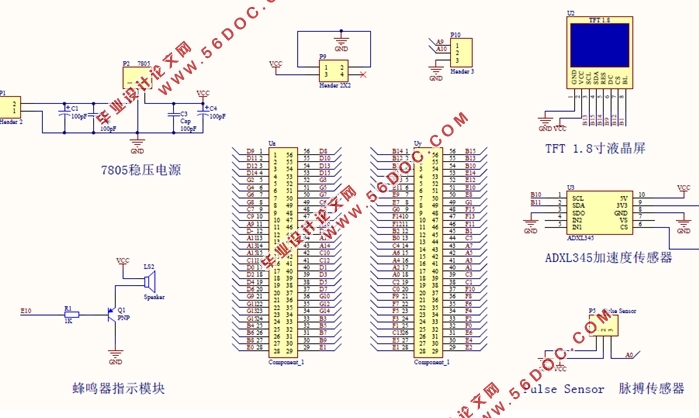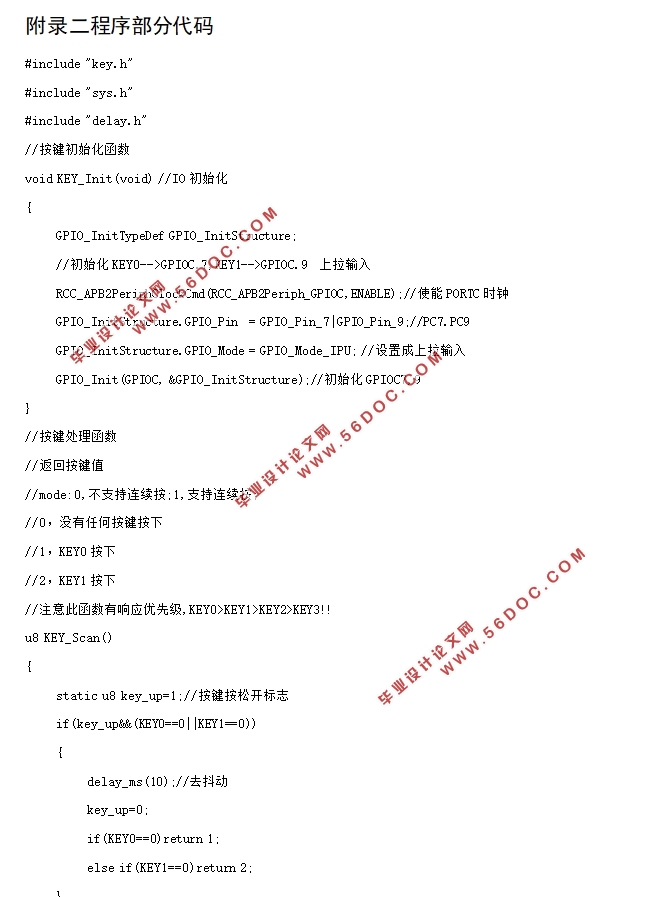基于stm32单片机的计步器设计(附系统原理图,程序清单)
来源:wenku7.com 资料编号:WK717216 资料等级:★★★★★ %E8%B5%84%E6%96%99%E7%BC%96%E5%8F%B7%EF%BC%9AWK717216
以下是资料介绍,如需要完整的请充值下载。
1.无需注册登录,支付后按照提示操作即可获取该资料.
2.资料以网页介绍的为准,下载后不会有水印.资料仅供学习参考之用. 密 保 惠 帮助
资料介绍
基于stm32单片机的计步器设计(附系统原理图,程序清单)(论文16000字)
摘要:随着社会的发展、人们生活水平提高地同时,都市的生活方式愈发地趋向于静态。因缺乏必要的体育运动而导致的健康问题,诸如肥胖症及“三高”、心脑血管疾病等并发症比比皆是。因此我们需要通过一种便捷的方式了解我们一天的运动量,结合专业合理的运动知识,制定我们应该所需的运动方案。本文通过基于STM32单片机的设计,采用ADXL345三轴加速度传感器和心率传感器分别来实现计步功能和测量心率功能,同时利用小液晶显示屏来显示数据,并通过蜂鸣器系统提醒当前走过的步数。该系统的设计旨在能够让佩戴者及时的了解当时的运动情况,从而起到督促和引导作用,是人们的日常健康生活的好助手。
关键词:计步器;心率测量;STM32;ADXL345
Pedometer Design Based on Stm32 SCM
Abstract:With the development of the society, people's living standards are improved,but the urban lifestyle tend to be more static than before at the same time.Due to the lack of necessary sports ,people have a lot of health problems which have produced many diseases such as obesity and "three highs",cardiovascular disease and so on.So it is essential for us to obtain our amount of exercise with a convenient way, combined with professional and reasonable sports knowledge, we could make the sport plan we need.In this paper, based on the STM32 microcontroller design, the system can be adopted ADXL345 triaxial acceleration sensor and the heart rate sensor respectively to implement step and measure heart functions, used small LCD screen to display the data, and remind the current steps through the buzzer systematthe same time .The system is designed to allow the wearer to obtain know the sports situation timely, to supervise and guide the role.So it’s agood health assistant in human’s daily life.
Key words:pedometer; heart rate measurement; STM32; ADXL345


目录
1绪论 1
1.1课题研究背景与意义 1
1.2国内外研究现状 1
1.2.1 国外发展状况 1
1.2.2 国内发展状况 2
1.3研究内容 2
2 总体设计方案 2
2.1系统功能要求 3
2.2硬件设计方案 3
2.2.1 系统硬件总框图 3
3 硬件设计 4
3.1 系统总电路图 4
3.2 检测电路 5
3.2.1 ADXL345传感器模块 5
3.2.2 (Pulse Sensor)脉搏心率测量模块 7
3.3显示电路 8
3.4 报警电路 10
3.5主控电路 10
3.5.1 单片机的选择 10
3.5.2 时钟电路和复位电路 13
3.5.3 电源电路 13
4 软件设计 14
4.1主程序设计 14
4.2 加速度传感器的程序设计 16
4.4 按键子程序设计 20
4.5 显示子程序设计 21
5 系统实现 23
6 结论 26
参考文献 26
致谢 28
附录 29
|





